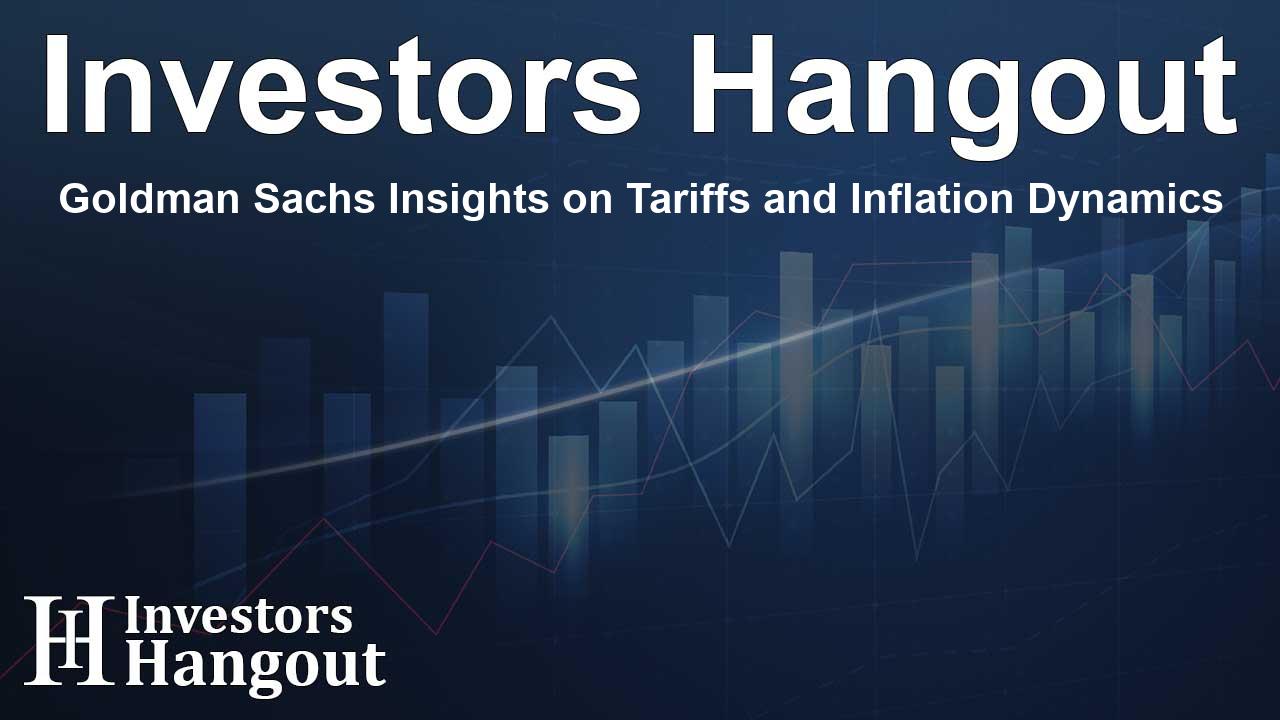Goldman Sachs Insights on Tariffs and Inflation Dynamics

Impact of Tariffs on Inflation Expectations
Recent analyses from Goldman Sachs have focused on the anticipated effects of tariffs imposed during Donald Trump's administration. The Federal Reserve appears likely to regard the inflationary impacts of these tariffs as temporary increases rather than ongoing inflationary trends. This perspective presents a nuanced understanding of how policy decisions are formed in the face of economic pressures.
Understanding Temporary Effects vs. Persistent Inflation
The analysts at Goldman Sachs have expressed recognition of a potential for tariffs to elevate inflation expectations, which could hinder the Federal Reserve’s flexibility in managing monetary policy. This is especially critical as rising inflation creates a ripple effect where sentiments can shift rapidly among consumers and businesses alike.
The Role of Consumer Sentiment
Goldman Sachs emphasizes the significant influence of lifetime inflation experiences on public expectations. The firm’s analysis utilizes data drawn from the University of Michigan’s consumer sentiment survey, illustrating that recent consumer experiences regarding inflation—particularly in noticeable categories like fuel prices—have profound effects on public perception.
Projected Impacts of Tariffs
In their baseline projections, Goldman Sachs anticipates that the introduction of tariffs will result in minimal alterations to inflation expectations. For instance, in scenarios where universal tariffs reach 10%, one-year inflation expectations may increase by approximately 0.5 percentage points, while five-year expectations could see an increase of merely 0.1 percentage points.
The Psychological Effects of Inflation
Despite these small projected impacts, analysts at Goldman Sachs caution that tariffs could evoke significant psychological responses in the public if certain price hikes receive extensive media coverage. Recent trends, such as the upticks in inflation expectations in Michigan, reveal that the public's heightened awareness of tariffs may significantly shape their economic outlook.
Policy Implications for the Federal Reserve
This growing sensitivity towards price changes due to tariffs may create challenges for policymakers. The Federal Open Market Committee (FOMC) might find it difficult to reduce interest rates if public sentiment is strongly influenced by tariff-related economic adjustments. Additionally, the White House could face mounting pressure to mitigate further tariff escalations in response to these shifts in consumer attitudes.
Final Thoughts
Overall, Goldman Sachs' insights provide a crucial understanding of how tariffs can sculpt the landscape of inflation expectations, particularly under the current economic environment characterized by fluctuating consumer sentiment. Such analyses are pivotal for both economic strategists and policymakers as they navigate through tariff-related challenges in the landscape of broader economic indicators.
Frequently Asked Questions
What is the main finding of Goldman Sachs regarding tariffs and inflation?
Goldman Sachs suggests that the Federal Reserve is likely to view inflation driven by tariffs as temporary rather than a long-term issue.
How do tariffs affect consumer inflation expectations?
Tariffs may raise inflation expectations, though their projected effects are minimal, according to Goldman Sachs’ analyses.
What role does media attention play in inflationary psychology?
Media coverage of price increases can significantly shape public sentiment and expectations regarding inflation related to tariffs.
How might the Federal Reserve respond to inflation driven by tariffs?
Given heightened consumer sensitivity to inflation, the Federal Reserve may opt to maintain rates rather than reduce them to address potential economic pressures.
Where do we see the most significant impact of inflation on consumers?
Areas like gas prices have a notable influence on consumer sentiment and expectations regarding overall inflation, as highlighted by Goldman Sachs’ findings.
About The Author
Contact Thomas Cooper privately here. Or send an email with ATTN: Thomas Cooper as the subject to contact@investorshangout.com.
About Investors Hangout
Investors Hangout is a leading online stock forum for financial discussion and learning, offering a wide range of free tools and resources. It draws in traders of all levels, who exchange market knowledge, investigate trading tactics, and keep an eye on industry developments in real time. Featuring financial articles, stock message boards, quotes, charts, company profiles, and live news updates. Through cooperative learning and a wealth of informational resources, it helps users from novices creating their first portfolios to experts honing their techniques. Join Investors Hangout today: https://investorshangout.com/
The content of this article is based on factual, publicly available information and does not represent legal, financial, or investment advice. Investors Hangout does not offer financial advice, and the author is not a licensed financial advisor. Consult a qualified advisor before making any financial or investment decisions based on this article. This article should not be considered advice to purchase, sell, or hold any securities or other investments. If any of the material provided here is inaccurate, please contact us for corrections.
